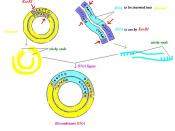Possibilities of Cloning
Cloning is one of the most controversial subjects of our times. Many are opposed to it for not only the religious implications but the ethical issue. The process is not yet perfected and if a human were to be cloned today, it would most likely produce a life that would created an outcry against human experimentation. This paper explores some of the issues involved.
Imagine the patient who has a heart attack. A cardiothoracic surgeon is called in to consult and suggests an experimental treatment using the body's own stem cells. A sample of bone marrow is taken from the hips, and processed using standard equipment found in most oncology centers for treating leukemia. The result is a concentrated number of special bone marrow cells, which are then injected back into the body - either into a vein in the arm, or perhaps direct into the heart itself.
The surgeon is returning that patient's own unaltered stem, the legal owner of said cells. This is not a new molecule requiring years of animal and clinical tests. Your own adult stem cells are available right now. No factory is involved - nor any pharmaceutical company sales team. What is more, there are no ethical questions (unlike embryonic stem cells), no risk of tissue rejection, and no risk of cancer.
For many these ideas are hard to imagine, but are more than possible with the advancements of stem cell research. Take for example, the work of Professor Jonathan Slack at Bath University. He has shown how adult human liver cells can be transformed relatively easily into insulin producing cells such as those found in the pancreas. This is amazing news for people like me, who have diabetes. He also has pioneered the work of others using bone marrow cells...


